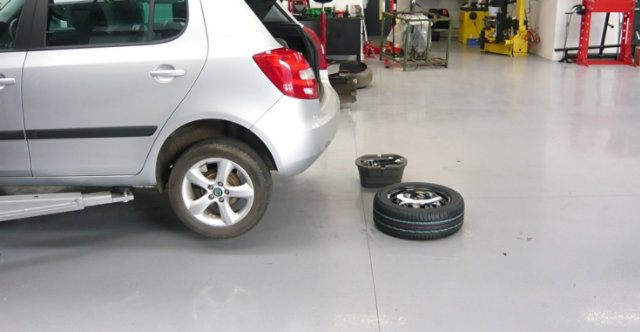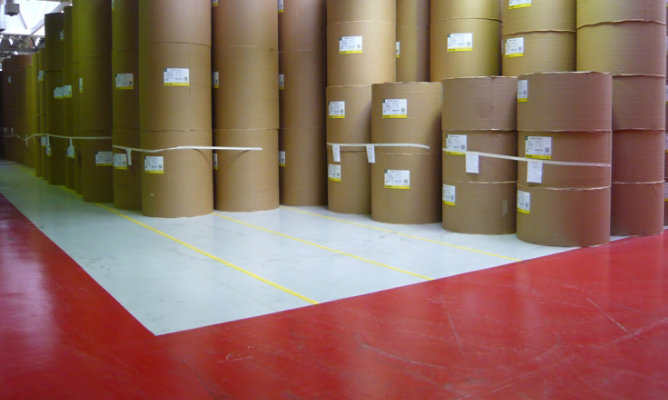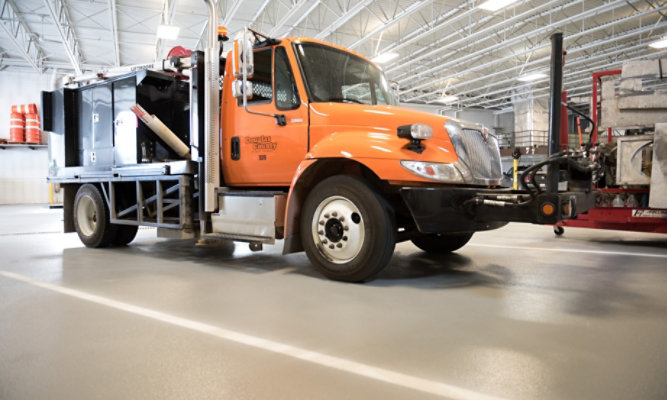
Chemical Resistant Flooring and Coatings
Whether commercial or industrial, concrete floors are porous by nature. Without the proper protective coating, solvents, acids, alkalis, and other compounds can be absorbed by the concrete slab and deteriorate it from within—they may even flow straight through and contaminate the soil underneath. Our full line of chemical resistant flooring & coatings protects both your concrete floor and the environment around it, helping prevent damage from exposure to corrosive compounds. These flooring systems are used in commercial kitchens and laboratories, food production facilities, manufacturing plants and other environments, and they can give you the lasting protection you need for your business, too.
Learn More or Get a Free Flooring Evaluation
What Are Chemical Resistant Floors?
Chemical resistant floors are specialized flooring systems designed to withstand exposure to harsh substances such as acids, alkalis, solvents and other corrosive materials. Unlike conventional flooring, they are formulated to resist chemical degradation that can lead to surface damage, delamination or even structural failure over time.
These systems are particularly important in industries where routine chemical use is part of day-to-day operations, such as laboratories, manufacturing facilities and food and beverage plants. The ability to prevent breakdown due to chemical contact helps extend the life of the floor, minimize repair costs and maintain the structural integrity of the facility.
Sherwin-Williams chemical resistant flooring systems provide durable and long-lasting protection tailored to specific chemical environments.
How Chemical and Acid Resistance Works in Flooring
Chemical resistance in flooring is achieved through the use of advanced resin technologies and engineered topcoats that form a strong barrier against corrosive agents. These layers prevent chemicals from penetrating the surface and damaging the substrate beneath. The resistance level depends on factors such as the type of resin used, the concentration and temperature of the chemicals and the length of exposure.
Specifically, resinous flooring systems—such as those made with epoxy or urethane—bond directly to the substrate, creating a seamless and impermeable surface. When properly installed, these coatings form a non-porous shield that prevents aggressive chemicals from seeping into cracks or joints where they can cause damage.
Additionally, the selection of the correct topcoat provides tailored resistance to specific types of chemicals, such as acids, alkalis and solvents. These protective barriers are formulated to maintain their integrity even under conditions of thermal cycling, heavy wear or prolonged chemical exposure.
Benefits of Chemical Resistant Flooring
Installing chemical resistant flooring offers a wide range of advantages that go beyond chemical protection. These systems contribute to a safer, more efficient and more cost-effective working environment.
Safety
Floors that resist chemical damage reduce the risk of cracks, holes or slick surfaces, helping to prevent slips, trips and falls. Damaged flooring can quickly become a workplace hazard, especially in high-traffic or wet environments. Chemical resistant coatings ensure the surface remains intact and secure, which supports overall employee safety and minimizes accident-related downtime.
Durability
Chemical and acid resistant floors are designed to handle not only chemical exposure but also wear and tear from foot traffic, machinery and thermal shock. The strength of the resin systems and topcoats ensures long-lasting performance, even under the most demanding conditions. This durability reduces the need for frequent repairs or replacement, making them a smart long-term investment.
Cost-Efficiency
Investing in chemical resistant flooring can significantly reduce maintenance costs, downtime and repair expenses over the lifespan of the floor. Facilities can avoid costly interruptions to production due to flooring failures, and the initial investment often pays for itself by reducing the frequency of replacements.
Additionally, these floors can help lower liability costs by contributing to a safer work environment.
Compliance
Facilities in regulated industries such as food processing and healthcare must meet stringent hygiene and safety standards, which chemical resistant flooring helps support. These systems are easy to clean, resistant to microbial growth and compliant with industry-specific requirements.
By maintaining a clean and damage-free floor, facilities are better equipped to pass inspections and avoid regulatory violations.
Where Are Chemical Resistant Floors Used?
Chemical resistant flooring is a critical component for operations across a variety of sectors. Wherever aggressive chemical substances are present, these floors provide essential protection and performance.
Pharmaceutical Manufacturing
In pharmaceutical environments, contamination control and safety are paramount. Chemical resistant floors withstand aggressive sanitizing agents and accidental spills while supporting strict cleanliness protocols.
Food and Beverage Processing Plants
These facilities often use harsh cleaning chemicals and acids that can break down standard flooring materials. Chemical resistant floors help maintain hygiene standards, reduce downtime and prevent microbial growth in joints or cracks.
Healthcare Facilities
Hospitals, laboratories and surgical areas use a range of chemicals for disinfection and maintenance. Floors that resist chemical damage are vital for maintaining sterile environments and minimizing health risks.
Chemical Processing and Manufacturing Plants
Chemical processing and manufacturing facilities routinely handle high concentrations of caustic or corrosive substances. Chemical resistant floors protect the structural integrity of the facility, reduce maintenance and ensure a safer work environment.
Automotive and Aerospace Industries
In the automotive and aerospace industries, exposure to oils, solvents, fuels and other chemicals is common. Floors need to withstand this exposure while also supporting heavy machinery and equipment without degrading, which is why installing a durable and chemical resistant flooring system is key.
Laboratories and Research Centers
Labs frequently deal with chemical spills and experimental compounds. Flooring must remain intact and chemically stable to maintain the safety and integrity of the workspace.
Warehouses and Storage Areas for Hazardous Materials
Storage environments that contain drums, containers or large volumes of chemicals or corrosive materials require floors that can contain and resist potential leaks or spills without posing risks to employees or the facility.
Why Choose Chemical and Acid Resistant Flooring?
Chemicals pose a real threat to facility flooring, and their effects can be both immediate and long-term. Over time, unprotected surfaces can suffer from surface erosion, structural weakening and costly downtime for repair or replacement. Even short-term exposure to certain aggressive agents can cause permanent stains or initiate delamination.
Chemical resistant floors provide long-term protection against a variety of hazards, from surface deterioration to safety concerns caused by compromised floor integrity. They also help facilities uphold a professional, clean appearance, which is especially important in customer-facing or regulated environments.
Thanks to this added protection, companies also avoid regulatory penalties and preserve the life of their infrastructure.
Caring for Chemical Resistant Floors
While chemical resistant floors are designed to endure harsh conditions, proper care and maintenance are essential to preserving their performance.
Spills should be cleaned promptly to prevent prolonged contact that can degrade even resistant coatings over time. Use approved, non-abrasive cleaners that are compatible with the flooring system to avoid damaging the protective topcoat.
Establish a regular cleaning and inspection schedule that includes daily sweeping, wet cleaning and periodic evaluations of surface condition. Address any signs of wear, cracking or delamination early to prevent bigger issues from developing. It’s also wise to train staff on proper cleaning techniques and safe spill response procedures.
With proper upkeep, a high-quality chemical resistant floor can provide years of reliable protection, reduce liability and ensure operational continuity in even the most demanding environments.
Types of Chemical Resistant Flooring
A variety of flooring technologies are available to meet the demands of chemical exposure, but resinous systems remain a popular choice for their seamless, customizable and high-performance capabilities. At Sherwin-Williams, we manufacture a variety of specialized industrial concrete resin floor systems that are impervious to many of the chemicals used in commercial and industrial operations.
By making it easier to isolate, clean up and contain hazardous substances, these high performance chemical resistant floorings and coatings help keep your facility, employees, surrounding community and the environment safer.
Epoxy
Epoxy flooring systems offer excellent chemical resistance and are widely used in a range of industrial and commercial environments. These systems provide a smooth, durable and easy-to-clean surface that can withstand exposure to many common chemicals.
Epoxies can also be formulated for enhanced mechanical strength and abrasion resistance, making them ideal for areas with heavy foot and equipment traffic.
Polyurethane
Urethane coatings are known for their superior resistance to abrasion, impact and thermal shock, making them well-suited for environments where hot water washdowns or rapid temperature changes occur. Polyurethane flooring systems also offer resistance to a broad spectrum of chemicals and ultraviolet (UV) exposure, which helps preserve color and integrity over time.
These systems are often used in food and beverage, pharmaceutical and processing facilities.
Cementitious Urethane
Cementitious urethane systems are extremely durable, offering exceptional thermal shock and chemical resistance. These systems are moisture-tolerant during application, which makes them ideal for humid or damp environments. They are also designed to withstand aggressive cleaning routines and heavy-duty usage, making them a go-to option in the food processing, beverage and brewing industries.
MMA (Methyl Methacrylate)
MMA flooring systems cure rapidly and can be installed in extremely fast turnaround times, often within a single day. They are ideal for facilities that require minimal downtime. MMA coatings offer solid chemical resistance and perform well in environments where speed and flexibility are critical. They are also UV-resistant and suitable for both interior and exterior applications.
Accelera™
Accelera flooring systems offer excellent wear and chemical resistance. They are available in a wide range of colors, and quartz or chip blends and are a favorite in many environments including cleanrooms, laboratories, schools, pharmaceutical facilities, supermarkets and many more.
Acrylic
Acrylic flooring systems are lightweight, fast-curing and easy to install. They offer moderate chemical resistance and are a good solution for areas that need quick flooring refreshes or aesthetic enhancements without compromising surface protection.
While not as robust as epoxy or urethane systems, they are useful in light industrial and retail settings.
How to Choose the Right Chemical Resistant Resin Flooring System
Selecting the right chemical resistant floor begins with understanding the unique needs of your facility. Start by identifying the specific chemicals present and the concentration levels to ensure compatibility with the flooring system. It’s also important to assess the operational environment, including exposure to heat, moisture, heavy equipment or foot traffic.
Evaluate the desired lifespan of the floor, the acceptable level of downtime for installation and any safety requirements such as slip resistance, antimicrobial properties or static dissipation. Color and finish preferences may also play a role in environments where appearance matters.
Ultimately, the topcoat selection is key. It acts as the protective shield that defines the floor’s chemical performance. But you don’t have to choose between impressive chemical resistance and a beautiful finish. Whether your design is a solid color, a decorative chip blend, a quartz blend, a metallic powder floor or even installed with a custom pattern or company logo, our high tech, safe and clean flooring and coatings match your decor while providing powerful chemical resistance.
Consulting with Sherwin-Williams representatives ensures you choose a system tailored to your performance needs, compliance requirements, operational goals and aesthetic preferences.
Chemical Resistant Flooring FAQs
Are Epoxy Floors Chemical Resistant?
Yes, epoxy floors are chemical resistant and widely used in industrial and commercial settings where exposure to chemicals is common. Their seamless, non-porous surface helps prevent chemical penetration, making them suitable for many environments including manufacturing, pharmaceutical and food processing facilities.
What Will Damage an Epoxy Floor?
Epoxy floors can be damaged by prolonged exposure to harsh chemicals, especially if the coating isn’t designed for that specific chemical. High concentrations of strong acids or solvents, extreme heat, improper cleaning agents and physical abrasion from heavy machinery can also compromise the coating over time.
What Are Other Types of Chemical Resistant Flooring Besides Epoxy?
In addition to epoxy, there are several other resinous flooring systems with excellent chemical resistance, including polyurethane, cementitious urethane, MMA (methyl methacrylate) and acrylic. Each has unique properties that make it suitable for specific applications depending on the chemicals involved, installation timeline and environmental conditions.
Is Urethane Flooring Better Than Epoxy for Chemical Resistance?
Urethane flooring systems generally offer better resistance to thermal shock and abrasion, while epoxies offer higher levels of chemical resistance. Cementitious urethane is particularly well-suited for environments with aggressive cleaning protocols, temperature fluctuations and moisture.
Can Chemical Resistant Floors Also Be Slip Resistant?
Yes, chemical resistant floors can be customized with slip resistant textures and additives. These safety enhancements are especially important in wet or spill-prone areas like food processing plants, laboratories and industrial work zones.
How Long Do Chemical Resistant Floors Last?
When properly installed and maintained, chemical resistant floors can last 10 to 20 years or more. Their lifespan depends on the specific product, the level of chemical exposure and adherence to recommended cleaning and maintenance procedures.
How Do I Maintain a Chemical Resistant Floor?
To maintain a chemical resistant floor, regular cleaning using non-abrasive, pH-neutral cleaners is recommended. Spills should be cleaned promptly to prevent degradation over time, and periodic inspections should be conducted to check for signs of wear or damage. Following a consistent maintenance schedule will help maximize the floor’s longevity and performance.
Sherwin-Williams: The Leader in Chemical and Acid Resistant Flooring
Sherwin-Williams is a strategic partner in building durable, compliant and high performance flooring systems. With a legacy of innovation and expertise in coatings and surface solutions, we bring unmatched technical knowledge to every project. Our flooring specialists work closely with facility managers, contractors and engineers to assess the unique demands of each environment and deliver tailored, long-lasting solutions.
We offer a full range of resinous flooring systems engineered to perform under extreme chemical exposure, thermal shock and mechanical stress. In addition to product excellence, our commitment to service means you’ll receive support at every step, from specification through installation and beyond. Our nationwide network ensures rapid access to materials, technical guidance and on-site expertise, so you can keep your operations running smoothly and safely.
Sherwin-Williams is trusted across industries for quality, reliability and performance. When it comes to chemical resistant flooring, there’s no better partner to help protect your facility, reduce risks and maximize long-term value.
Protect Your Floors from Chemicals and Acids with Sherwin-Williams Flooring Solutions
With decades of expertise in protective and performance coatings, Sherwin-Williams offers chemical resistant flooring systems that stand up to the toughest environments. While every one of our high performance industrial concrete floor systems provides a level of protection against chemical damage, these systems offer you the superior strength you need in extreme chemical environments.
Sherwin-Williams resin flooring solutions are specially formulated to meet the rigorous demands of industrial, commercial and institutional facilities. We offer a wide range of epoxy, polyurethane, cementitious urethane, MMA and acrylic products and can create a solution that holds up to the unique challenges and chemical risks of your project.
Our team is ready to help you design and install a flooring system that delivers long-term value, safety and peace of mind. Contact a Sherwin-Williams representative today to learn more about our chemical resistant floors.
Discover More
Industry Expertise and Innovation
See how we help customers find customized solutions for their project and application challenges.
System Lookup
Find out more about our innovative floor systems for a variety of industries.
FIND A SYSTEM

